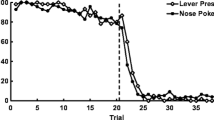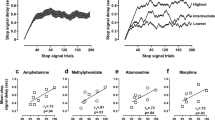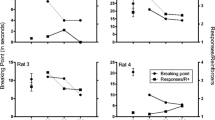Abstract
Ethanol and other drugs commonly disrupt responding under repeated acquisition and performance baselines, with responding in the former condition being more sensitive to such disruption than the latter. The present study was conducted to determine if differential drug effects would occur when baseline rates of responding were comparable in the two baseline conditions. The acute effects of ethanol (0, 0.4, and 0.8 g/kg) were examined in healthy adult volunteers responding under a multiple schedule of repeated acquisition and performance of 10-response sequences. A 1-sec delay occurred after each response to keep rates of responding comparable in the acquisition and performance conditions. This delay also reduced differences in reinforcement rates between the two components. Nevertheless, responding in the acquisition condition was still more sensitive to the disruptive effects of ethanol than responding in the performance component. This differential sensitivity to ethanol was most evident in measures of accuracy of responding (e.g., percentage of errors). These findings suggest that differences in overall rates of responding and reinforcement in the repeated acquisition and performance conditions contribute little, if anything, to the differential drug effects observed on those baselines.
Similar content being viewed by others
References
BARTHALMUS, G. T., LEANDER, J. D., & MCMILLAN, D. E. (1978). Combined effects of ethanol and diazepam on performance and acquisition of serial position sequences by pigeons. Psychopharmacology, 59, 101–102.
BICKEL, W. K., HIGGINS, S. T., & GRIFFITHS, R. R. (1989). Repeated acquisition and performance of response sequences in humans: Chronic effects of diazepam. Journal of the Experimental Analysis of Behavior, 52, 47–56.
BICKEL, W. K., HUGHES, J. R., & HIGGINS, S. T. (in press). The human behavioral pharmacology of benzodiazepines: Effects on the repeated acquisition and performance of response chains. Drug Development Research.
BOREN, J. J. (1963). Repeated acquisition of new behavioral chains. American Psychologist, 17, 421.
DESJARDINS, P. J., MOERSCHBAECHER, J. M., THOMPSON, D. M., & THOMAS, J. R. (1982). Intravenous diazepam in humans: effects on acquisition and performance of response chains. Pharmacology Biochemistry & Behavior, 17, 1055–1059.
DEWS, P. B., & WENGER, G. R. (1977). Rate dependency of the behavioral effects of amphetamine. In T. Thompson & P. B. Dews (Eds.), Advances in Behavioral Pharmacology (Vol. 1, pp. 167–227). New York: Academic Press.
GOLLUB, L. R. (1964). The relations among measures of performance on fixed-interval schedules. Journal of the Experimental Analysis of Behavior, 7, 337–343.
GRIFFITHS, R. R., BIGELOW, G. E., & HENNINGFIELD, J. E. (1980). Similarities in animal and human drug taking behavior. In N. K. Mello (Ed.), Advances in substance abuse (pp. 1–90). Greenwich, CT: Jai Press.
Higgins, S. T., BICKEL, W. K., O’LEARY, D. K., & YINGLING, J. (1987). Acute effects of ethanol and diazepam on the acquisition and performance of response sequences in humans. Journal of Pharmacology and Experimental Therapeutics, 243, 1–8.
H, S. T., & MORRIS, E. K. (1984). Generality of free-operant avoidance conditioning to human behavior. Psychological Bulletin, 96, 247–272.
HIGGINS, S. T., & STITZER, M. L. (in press). Comparison of the effects of secobarbital and diazepam on the acquisition of response sequences in humans. Drug Development Research.
HIGGINS, S. T., WOODWARD, B. M., & HENNINGFIELD, J. E. (1989). Effects of atropine on the repeated acquisition and performance of response sequences in humans. Journal of the Experimental Analysis of Behavior, 51, 5–15.
LATIES, V. G. (1975). The role of discriminative stimuli in modulating drug action. Federation Proceedings, 34, 1880–1888.
MOERSCHBAECHER, J. M., THOMPSON, D. M., & WINSAUER, P. J. (1983). Effects of heroin, methadone, Laam and cyclazocine on acquisition and performance of response sequences in monkeys. Pharmacology Biochemistry & Behavior, 19, 701–710.
PICKER, M., & POLING, A. D. (1984). Effects of anticonvulsants on learning: Performance of pigeons on a repeated acquisition procedure when exposed to phenobarbital, clonazepam, valproic acid, ethosuximide and phenytoin. Journal of Pharmacology and Experimental Therapeutics, 230, 307–316.
REES, D. C., WOOD, R. W., & LATIES, V. G. (1985). The roles of stimulus control and reinforcement frequency in modulating the behavioral effects of d-amphetamine in the rat. Journal of the Experimental Analysis of Behavior, 43, 243–255.
THOMPSON, D. M. (1973). Repeated acquisition as a behavioral baseline for studying drug effects. Journal of Pharmacology and Experimental Therapeutics, 184, 506–514.
THOMPSON, D. M. (1974). Repeated acquisition of behavioral chains under chronic drug conditions. Journal of Pharmacology and Experimental Therapeutics, 188, 700–713.
THOMPSON, D. M. (1978). Stimulus control and drug effects. In D. E. Blackman & D. J. Sanger (Eds.), Contemporary research in behavioral pharmacology (pp. 159–207). New York: Plenum Press.
THOMPSON, D. M., & MOERSCHBAECHER, J. M. (1979). Drug effects on repeated acquisition. In T. Thompson & P. B. Dews (Eds.), Advances in behavioral pharmacology (Vol. 2, pp. 229–259). New York: Academic Press.
Author information
Authors and Affiliations
Rights and permissions
About this article
Cite this article
Higgins, S.T., Bickel, W.K., Rush, C.R. et al. Comparable Rates of Responding and Reinforcement Do Not Eliminate the Differential Effects of Ethanol on Response Chain Acquisition and Performance. Psychol Rec 39, 583–595 (1989). https://doi.org/10.1007/BF03395086
Published:
Issue Date:
DOI: https://doi.org/10.1007/BF03395086




